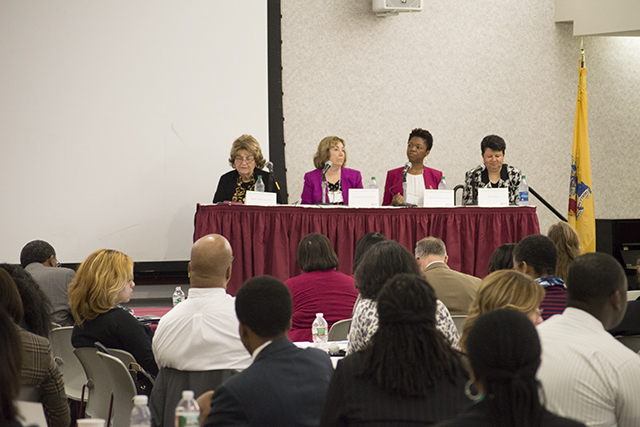
Photo by Hope Patti
On Friday, Ramapo hosted its 15th annual Diversity Issues in Higher Education Conference. The event included many different panels and was, therefore, able to cover various issues regarding diversity and inclusiveness in college communities everywhere.
The initial discussion presented different perspectives on higher education, access and equity. Barbra Siperstein, a member of the Democratic National Committee and director of the Gender Rights Advocacy of New Jersey, spoke during this discussion. She covered the challenges that transgender youth face in today’s society.
“The harassment and discrimination against trans people is facilitated directly or indirectly by the policies and culture of those educational institutions," Siperstein said. "We must push forward to change, not only our laws, but ultimately to change our cultural attitudes and values in order to attain societal respect for transgender people.”
Smaller breakout sessions were then held, and those attending the conference could pick one to sit in on. Their choices included discussions on law enforcement and race relations, transgender identity, student perspectives on diversity in action and a talk about higher education focusing on access and equity.
Whitney Wanton of Kean University spoke in the discussion about student perspectives on diversity in action, which focused on the problem of universities lacking cultural awareness.
“In order to take steps in making campuses more culturally diverse and aware, allowing students to have open discussions on controversial cultural matters will take the elephant out of the room. We need to touch upon uncomfortable topics in order to get rid of assumptions and stereotypes,” Wanton commented at the breakout session.
The event concluded with a keynote discussion entitled “A Robust Conversation about Diversity in Action.” The discussion was moderated by Forrest Pritchett of Seton Hall University. He asked a series of questions directed toward the keynote panelists. The panelists included Yvette Donado, senior vice president of Educational Testing Service, Michael Gabriele of Peace Islands Institute, and Elizabeth Williams Riley, the president and CEO of the American Conference on Diversity.
Pritchett first inquired as to what the panelists believed is the most effective way to bring about change. Donado commented that diversity must start from the top.
“The CEO of the organization must declare that diversity is going to happen. Otherwise, you are going upstream without a paddle,” Donado said.
The second question posed by Pritchett was about the techniques each panelist is familiar with in order to empower individuals. Riley encouraged the audience to transform words into action by staying engaged and by paying as much attention to unconscious privilege as they do to unconscious bias. She added that addressing racism requires both personal and collective action.
Students and faculty that attended the event received a thorough education on issues of diversity in higher education.
“Each speaker answered the question from the point of view of his or her own experience,” said Rebecca Gordy, a student of the teacher education program at Ramapo. “They all had valuable insights and expressed themselves eloquently about what they felt should be done and what had worked for them in the past. I got a lot out of their discussion.”
lheckelm@ramapo.edu





